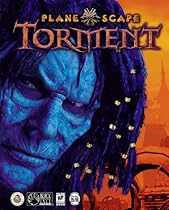Product Details
Planescape: Torment |
| List Price: | $79.95 |
| Price: | $15.97 |
Availability: Usually ships in 1-2 business days
Ships from and sold by GoGamer
31 new or used available from $14.00
Average customer review:
Product Description
Advanced Dungeons & DragonsProduct InformationThe Planescape "multiverse" is the settingfor the game - but setting is actually a misnomer... the Planescape multiverseis actually composed of a series of "planes" (other dimensions) thatrotate around a central city Sigil like spokes on a wheel.The city of Sigil is the central fixture of the Planescape multiverse. Alsocalled the "Cage" or the "City of Doors" it's unique inthat scattered throughout its labyrinth of streets are portals (some hiddensome obvious) that lead to anywhere in existence provided you hold the properkey. It is neutral ground and watering hole for races and creatures from acrossthe multiverse all under the watchful eye of the Lady of Pain the enigmaticruler of the city.The world of Planescape is a more adult hard-core fantasy setting comparedto other AD&D worlds. The architecture the people the creatures --everything has an edge to it. Belief emotions faith and other abstractconcepts actually make their presence felt in reality. In the Planescapemultiverse belief has the power to reshape worlds kill and resurrect beingsand change the laws of physics.Product Highlights Charactercreation is just the beginning - throughout the game your character adapts tofit your own personal gaming style. ThePlanescape universe is a setting you've NEVER experienced before filled withsharp-edged visuals bizarre adversaries and strange magics. Encounterinventory items with personalities. Manage an unpredictable party of thestrangest allies to walk the faces of alternate planes. Youcan regenerate speak with the dead and have magical immunities. You're a powerto be RECKONED with. Unfortunately so is everyone else.The Planescape multiverse is a setting like you'veNEVER experienced before. It gouges you with sharp-edged visuals bizarreadversaries that can murder you with an idea and strange magics that unravelcommon conceptions about physics andProduct Details
- Amazon Sales Rank: #1391 in Video Games
- Brand: Black Isle Studios
- Model: C95-862-0
- Released on: 1999-12-14
- ESRB Rating: Teen
- Platforms: Windows 98, Windows Me, Windows 95
- Dimensions: .25 pounds
Editorial Reviews
Amazon.com Review
In
Planescape: Torment, you play a nameless, scarred, immortal on a
quest to discover his past, his identity, and his role in the conflict
over the nature of reality. The brilliant role-playing and adventure
game focuses on the "Planescape" campaign setting of the Advanced
Dungeons & Dragons game, and combines the best elements of
Interplay's phenomenally successful Baldur's Gate with an
enthralling story line, well-written dialogue, and beautiful artwork and
graphics.
In an inspired choice, Black Isle Studios, the
developer of Planescape: Torment, has chosen to provide the
player, at least initially, with as little details about the story as
possible. After viewing a mysterious introductory movie, players guide
The Nameless One on a journey through the bleak city of Sigil and its
underground catacombs. The story leads from there to the bizarre
realities of alternate planes of existence, where belief and thought
determine the laws of physics. Through dialogue with hundreds of
nonplayer characters, puzzle solving, and point-and-click combat, The
Nameless One discovers clues about his identity and the circumstances
surrounding his condition.
Gamers overwhelmed by detailed
role-playing games will find Planescape: Torment easier to grasp;
players can freely switch between three different character classes
(Fighter, Mage, Thief) for The Nameless One as the game progresses, and
learning the combat and magic system--with a simple point-and-click
interface--takes only a few minutes. Literally hundreds of weapons,
items, spells, and "tattoos" can be collected and affixed to The
Nameless One or any of the several party members acquired during the
course of the game. If you're a fan of role-playing or adventure games, Planescape:
Torment's engrossing world creates a must-have gaming experience.
--Doug Radcliffe
Pros:
- Fascinating, unique setting
- Engrossing story
- Rich graphics and spell effects
- Intriguing dialogue
- Zoomed-in perspective tends to limit combat to close range
- Long load times

No comments:
Post a Comment